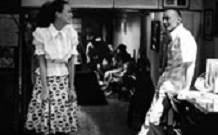|
|
||||
|
|
by Donald Levit  “Bits and pieces of memory,” says Hou Hsiao Hsien, reflecting on nostalgia, time, the un-reliveable past, and how all bear on a man’s present. The Taiwanese director speaks of his own adolescence in connection with Three Times, the original title of which, Zui hao de shi guang, better translates as Best of Times. Acclaimed as the year’s best undistributed film following inclusion in the 2005 New York Film Festival, and now being released by IFC, the triptych is not, however, autobiographical as such but, instead, a stately (at least in Parts One and Two) reflection on how epoch and circumstance influence action and reaction, the three takes on this connected through love relationships. At first envisioned in the vein of anthology New York Stories, with three directors, the project proved too unwieldy to attract backing, so Hou did the whole thing. He actually began with the more complicated last part, which occupied forty of the fifty-eight days’ shooting and, strangely or not, is off-putting and the least effective. The composite is non-linear -- “fragmented” is a word which will crop up -- in that first comes 1966, “a short . . . introduction and an epilogue” which grew organically to become on its own the best, most moving of the three. Despite mumbo jumbo rationalizations about the order, it remains unclear why we begin during that time when Hou was nineteen, then are taken back to 1911 before being fast-forwarded to the raucous present day. If anything, and if anything is indeed intended, the two pasts come off as innocent, sane and liveable compared to the noise, neon, congestion, drugs and tech-gadgetry of In “Kaohsiung: A Time for Love” of forty years ago, young women come to live upstairs and work a while in Ma’am’s billiards parlor, then move on, to be replaced by others. In this sweet love tale like they don’t make any more, they play pool with locals, are simply (and fully) dressed, and all is idyllic to the sounds of clacking balls. Arriving with a small white case, the newest girl, May (Shu Qi), lays out cues and chalk and attracts Chen (Chang Chen), a soldier who must soon report back to base. Three months later a brief letter arrives -- “Time flies. Remember me?” -- but she is gone when he returns, so he must track her through several villages. In a Huwei poolhall he finds her. Shy, delightfully tongue-tied, she brings tea and a cigarette and accompanies him to wait at the bus station, where the two likeable kids hold hands under an umbrella in the In a paneled Dadaocheng bordello, Mr. Chang (Chen once again) visits accomplished courtesan Ah Mei (Qi again) between travels with a Mr. Liang for the purpose of freedom from Japanese occupation. Putting to shame leering Western nudity, here is palpable sensuality of layered costumes and coiffures, house and furnishings, movements and, above all, of slow tradition-ingrained ceremony. He is intelligent, generous and high-minded, and though custom admits of concubines in addition to the Tai-tai, or number one wife, he refuses her modestly stated offer of concubinage. Asked by Madame to remain on, Ah Mei complies, her wordless, nearly tearless stoicism a thing of acting beauty. Time and tide dictate in 1911 but not in “2005: With a little more, but still not much, flesh, they are lovers, he a photographer of sorts, she a singer of sorts who also has a suicidal lesbian lover on the side. Communicating, or conveniently failing to do so, more by text messaging than verbally, they are as disconnected as this finale that noisily jars and, if there is any purpose, makes one long for the calm uncluttered past. Love promises conventional fulfillment and happiness in 1966, and it will continue although subjected to heartbreak that civilized people must bear in 1911. These two views alone are worth it for patient moviegoers who care, but both they and an impatient younger generation can take a pass on (Released by IFC Films; not rated by MPAA.) |
||
|
© 2024 - ReelTalk Movie Reviews Website designed by Dot Pitch Studios, LLC |



